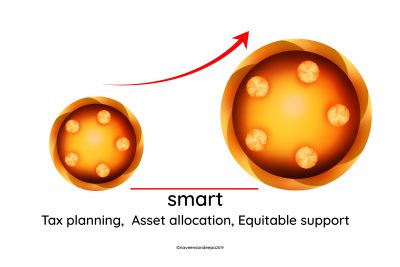How Division of Property in Ontario Works


When spouses cannot agree on asset division, legal processes like mediation, arbitration, or court intervention will determine the outcome.
In Ontario, couples who struggle to reach consensus on property division have several dispute resolution options. The recommended first step is working with a divorce mediator who can facilitate negotiations and help find middle ground. If mediation proves unsuccessful, couples may pursue:
- Arbitration – A neutral third party hears both sides and makes a binding decision
- Collaborative divorce – Both parties work with lawyers committed to settling outside court
- Court litigation – A judge applies the Ontario Family Law Act to divide assets
Working with a Certified Divorce Financial Analyst (CDFA) can provide valuable insights into fair asset division and long-term financial implications. This professional guidance often helps couples reach an agreement before requiring court intervention, saving both time and money.
Retirement accounts in Ontario divorces are typically split 50/50 for the portion accumulated during marriage
In Ontario, retirement savings and pension benefits accumulated during marriage are considered family property and must be divided equitably upon divorce. This includes:
- Registered Retirement Savings Plans (RRSPs) – Can be transferred tax-free between spouses using a T2220 form
- Company Pensions – The portion earned during marriage is typically split through a pension division order
- Canada Pension Plan (CPP) Credits – Credits accumulated during marriage can be equally divided
- Private Investment Accounts – Retirement investments outside registered plans are also divided
The division process usually involves calculating the difference between the value at marriage and separation dates. Couples may choose to trade other assets instead of splitting specific accounts, known as “equalization.” Working with financial and legal professionals helps ensure a tax-efficient transfer and fair distribution.
Mediation is optional but highly recommended for dividing assets during separation in Ontario
While not legally mandatory, divorce mediation offers a cost-effective and collaborative approach to asset division in Ontario. Working with a professional family mediator can help couples navigate complex financial decisions while maintaining control over the outcome.
- Saves time and money compared to court litigation
- Provides a neutral environment for negotiation
- Allows couples to maintain privacy and confidentiality
- Creates opportunities for creative settlement solutions
- Helps preserve important family relationships
Both certified divorce mediators and divorce financial analysts can guide couples through the asset division process, ensuring fair and informed decisions while reducing stress and conflict.
Dividing assets during an Ontario divorce can trigger various tax obligations that require careful planning
When splitting assets in an Ontario divorce, several tax considerations come into play that can significantly impact your financial outcome. Understanding these implications early in the process helps minimize tax burdens and ensures a more equitable division.
- Capital gains tax applies when transferring or selling properties, except for your principal residence
- Investment accounts may trigger immediate tax consequences when divided or liquidated
- Pension splitting requires careful consideration of future tax implications and proper documentation
- RRSP transfers between spouses can be done tax-free if properly structured
- Land transfer tax may apply when transferring property ownership between former spouses
Working with a Certified Divorce Financial Analyst (CDFA) and tax professional can help develop strategies to minimize tax exposure while ensuring compliance with Canadian tax laws.
The family home can be handled in multiple ways during an Ontario divorce without requiring a sale.
In Ontario, divorcing couples have several options for dealing with the matrimonial home that don’t necessarily require selling. The most common arrangements include:
- Buyout arrangement – One spouse purchases the other’s equity share
- Deferred sale agreement – Both parties maintain ownership until an agreed-upon future date
- Continued co-ownership – Partners keep joint ownership, often until children finish school
- Nesting arrangement – Children stay in the home while parents rotate residency
Working with a divorce mediator or financial analyst can help couples evaluate these options and determine the most financially sound solution that serves both parties’ interests. The chosen arrangement should consider factors like mortgage affordability, market conditions, and each spouse’s housing needs.
Assets in Ontario divorces must be professionally valued at fair market value on the separation date
The proper valuation of matrimonial assets is a crucial step in Ontario divorce proceedings. A comprehensive asset valuation ensures fair division of property between spouses under the Family Law Act.
Common assets requiring professional valuation include:
- Real estate properties – homes, vacation properties, rental units
- Financial investments – stocks, bonds, mutual funds, RRSPs
- Pension plans – both private and government pensions
- Business interests – corporations, partnerships, sole proprietorships
- Vehicles and valuables – cars, boats, jewelry, art collections
To ensure accurate valuations, couples typically engage certified professionals like real estate appraisers, pension valuators, or Chartered Business Valuators. A Certified Divorce Financial Analyst (CDFA) can coordinate the overall valuation process and provide expert guidance for complex asset portfolios.
Courts intervene in Ontario asset division when spouses cannot reach a mutual agreement
The Ontario court system becomes involved in matrimonial property division when separating spouses fail to negotiate a settlement on their own or through alternative dispute resolution. While court intervention provides a formal resolution process, it typically involves:
- Higher costs and longer timelines than mediated settlements
- Application of the Family Law Act guidelines for equalization of net family property
- Formal documentation of all assets, debts and financial records
- Court-appointed evaluations of disputed property values
To avoid court proceedings, couples are encouraged to first explore collaborative options like mediation, arbitration, or working with a Certified Divorce Financial Analyst to reach an equitable agreement. These alternatives often provide more control over the outcome while saving time and money.
Financial statements, property records, and asset documentation are required for divorce asset division in Ontario
To properly divide matrimonial assets during an Ontario divorce, you’ll need to gather comprehensive financial documentation. Essential documents include:
- Property documentation – house deeds, mortgage statements, and property assessments
- Financial records – bank statements, investment portfolios, and RRSP accounts
- Employment information – pay stubs, pension statements, and benefits documentation
- Debt records – credit card statements, loans, and line of credit details
- Personal assets – vehicle ownership, valuable collections, and business interests
Having complete and accurate documentation helps ensure a fair division of matrimonial property under Ontario’s Family Law Act. Consider working with a Certified Divorce Financial Analyst (CDFA) to properly organize and evaluate these documents for an efficient settlement process.
Yes, couples in Ontario can split assets amicably through mediation and collaborative methods
Dividing matrimonial assets amicably is not only possible but highly recommended in Ontario divorces. Working with a divorce mediator or Certified Divorce Financial Analyst (CDFA) can help facilitate a smooth process while saving time and money.
- Mediation allows couples to maintain control over asset division decisions
- Professional mediators help ensure fair and equitable distribution
- The collaborative approach typically costs less than litigation
- Amicable settlements often lead to better post-divorce relationships
- Both parties can receive independent legal advice throughout the process
Once an agreement is reached, the terms can be formalized in a separation agreement and submitted to the court as part of the divorce proceedings.
A separation agreement is strongly recommended in Ontario for legally documenting asset division during separation
While not legally mandatory, a formal separation agreement provides essential protection and clarity when dividing assets in Ontario. This legally binding document helps prevent future disputes and ensures both parties clearly understand their rights and obligations.
- Creates a clear record of how property, debts, and assets will be divided
- Becomes legally enforceable once properly signed and witnessed
- Helps streamline any future divorce proceedings
- Protects both parties’ financial interests
- Can address additional matters like support payments and shared property
Working with a family law professional or divorce mediator ensures your separation agreement comprehensively addresses all relevant financial aspects and meets Ontario legal requirements.
Business assets are considered matrimonial property and must be divided equitably during an Ontario divorce
In Ontario, a business owned during marriage is treated as a matrimonial asset and must be included in the property division process. The business value is determined through professional valuation, considering factors like revenue, assets, and market conditions.
Common methods for dividing business interests include:
- Buyout arrangement – one spouse purchases the other’s share
- Asset offset – trading other assets of equal value
- Business sale – selling the enterprise and splitting proceeds
- Co-ownership – continuing to run the business together (less common)
Working with qualified business valuators, accountants, and family law professionals is essential to ensure accurate valuation and fair division while maintaining business operations during the separation process.
In Ontario divorces, matrimonial debts are typically split equally between spouses
When dividing assets and debts during an Ontario divorce, matrimonial debts acquired during the marriage are generally shared equally between both parties, regardless of whose name is on the account. This is part of the province’s equalization of net family property process.
Common types of shared matrimonial debts include:
- Mortgage payments on the family home
- Joint credit card balances and credit lines
- Bank loans taken during the marriage
- Vehicle financing for family vehicles
- Home equity lines of credit (HELOCs)
However, debts incurred before the marriage or after separation typically remain the responsibility of the individual spouse. Working with a divorce mediator or financial analyst can help ensure a fair and legally sound division of matrimonial debts.
Inheritance is typically protected from division during divorce in Ontario if kept separate from marital assets
Under Ontario’s Family Law Act, inheritance received during marriage is considered “excluded property” and can remain solely yours after divorce. However, maintaining this protection requires careful management of inherited assets.
To protect your inheritance, you should:
- Keep inherited funds in a separate bank account under your name only
- Maintain clear documentation of the inheritance source and date received
- Avoid mixing inherited money with joint marital funds or assets
- Use caution when using inheritance for shared family purchases or investments
Be aware that any income or appreciation generated from inherited assets may be subject to division if not properly segregated. For complex inheritance situations, consulting a family law professional is strongly recommended to ensure proper protection of your inherited assets.
In Ontario, pension benefits accumulated during marriage must be divided equally between spouses during divorce
Under Ontario’s Family Law Act, pensions are considered family property and must be shared as part of the divorce settlement. The portion of the pension earned during the marriage period (from the date of marriage until separation) is subject to an equal division between spouses.
- The pension’s commuted value must be professionally calculated
- Spouses can choose between an immediate pension split or a pension value offset against other assets
- Special rules apply to different types of pensions (defined benefit, defined contribution, government pensions)
- Both parties should seek professional financial advice to understand their pension division options
In Ontario, the matrimonial home is typically split 50-50 between spouses during divorce, regardless of ownership.
Under Ontario’s Family Law Act, the matrimonial home receives special treatment during divorce proceedings. Both spouses have equal right to possess the family home, even if only one person’s name is on the title. Common resolution options include:
- Selling the home and dividing the proceeds equally
- One spouse buying out the other’s share at fair market value
- Deferred sale arrangement where one spouse remains temporarily
- Trading the home’s value against other family assets
It’s important to note that even if one spouse owned the home before marriage, its full value must still be shared equally upon divorce. Professional guidance from a family law expert can help determine the most beneficial arrangement for both parties.
All property and assets acquired during marriage are subject to division in Ontario divorces
In Ontario, matrimonial property division encompasses a wide range of assets acquired by either spouse during the marriage. The law considers both assets and debts when determining fair distribution.
Common matrimonial assets include:
- The matrimonial home, regardless of whose name is on the title
- Financial accounts and investments (RRSPs, TFSAs, stocks)
- Pension plans and retirement savings
- Vehicles and recreational properties
- Business interests and partnerships
- Household items and valuable collections
Certain assets may be exempt from division, including gifts and inheritances received during marriage, and property owned before the marriage date. It’s essential to work with a qualified family law professional to properly identify, value, and categorize all assets for equitable distribution.
Prenuptial agreements are legally binding and enforceable in Ontario when properly executed
In Ontario, courts generally respect and enforce prenuptial agreements (also called marriage contracts) during asset division, provided they meet specific legal requirements. These agreements serve as legally binding contracts that outline how property and assets will be divided if the marriage ends.
For a prenuptial agreement to be valid in Ontario, it must meet the following criteria:
- Both parties must provide full financial disclosure
- The agreement must be signed voluntarily without duress
- Both parties must receive independent legal advice
- The terms must be fair and reasonable at the time of enforcement
- The agreement must be properly executed in writing with witnesses
It’s essential to work with a qualified family law lawyer to ensure your prenuptial agreement complies with Ontario’s Family Law Act and will be upheld during property division proceedings.
Fair asset division ensures financial stability and protects both parties’ interests post-divorce
In Ontario, equitable distribution of matrimonial assets is crucial for maintaining financial stability and protecting the well-being of all parties involved. A fair division of assets helps establish a solid foundation for both spouses to rebuild their lives independently.
Key benefits of fair asset division include:
- Ensures both parties maintain a reasonable standard of living
- Protects the financial interests of dependent children
- Reduces potential conflicts and legal disputes
- Recognizes both monetary and non-monetary contributions to the marriage
- Promotes smoother transition to post-divorce life
Working with a qualified divorce mediator or financial analyst can help achieve an equitable settlement while minimizing stress and legal costs. This professional guidance helps ensure compliance with Ontario’s family law requirements while protecting both parties’ long-term financial interests.
In Ontario, marital assets are divided through mutual agreement or court-ordered equalization under the Family Law Act
The division of matrimonial property in Ontario follows the principle of equalization of net family property. While couples can negotiate their own settlement through mediation or collaborative divorce, the courts will intervene if an agreement cannot be reached.
- Spouses can create their own separation agreement with help from lawyers or mediators
- The court considers the value of all assets acquired during the marriage
- Each spouse is typically entitled to an equal share of the marriage’s accumulated wealth
- Certain assets may be excluded, such as inheritances and gifts from third parties
- Professional guidance from a family law lawyer or divorce financial analyst can help ensure a fair division
Professional divorce asset division help is available from mediators, financial analysts, and lawyers across Ontario
In Ontario, several qualified professionals can assist with dividing matrimonial assets during divorce proceedings. A divorce mediator helps facilitate peaceful negotiations between spouses, while a Certified Divorce Financial Analyst (CDFA) specializes in the financial aspects of separation.
- Family lawyers provide legal guidance and representation
- Divorce mediators offer neutral third-party facilitation
- CDFAs help analyze complex financial situations
- Legal Aid Ontario may provide assistance for qualifying individuals
- Many professionals now offer both in-person and virtual consultations
Most professionals offer free initial consultations to discuss your specific situation and outline potential strategies for asset division. Working with these experts can help ensure a fair and legally sound distribution of property and finances.
Begin asset division immediately upon deciding to separate in Ontario
Starting the process of asset division at the onset of separation is crucial for a smoother divorce transition. Early planning allows both parties to create a comprehensive inventory of shared property and establish clear financial boundaries.
- Document all matrimonial assets and debts
- Gather financial statements, property records, and investment portfolios
- Consider consulting a Divorce Mediator or Certified Divorce Financial Analyst
- Keep detailed records of the date of separation for valuation purposes
- Maintain separate financial accounts moving forward
Working with professional advisors early in the process can help ensure fair valuation and distribution while minimizing potential conflicts during negotiations.
In Ontario, matrimonial assets are divided through equalization of net family property
Under Ontario’s Family Law Act, the division of assets follows the principle of equalization, where both spouses are entitled to an equal share of the value of property acquired during marriage. The process requires careful documentation and often professional guidance.
- Both spouses must complete a detailed financial disclosure listing all assets and debts
- The valuation date is typically the date of separation
- Certain assets like inheritances and gifts may be excluded from division
- The matrimonial home receives special treatment regardless of ownership
- Spouses can negotiate terms through mediation or collaborative law
- A formal separation agreement must be drafted and signed by both parties
For complex asset divisions, it’s advisable to work with a family law lawyer and financial advisor to ensure a fair settlement that complies with Ontario law. The process can be completed through negotiation or, if necessary, through the court system.
Yes, couples in Ontario can divide assets through mediation, negotiation, or arbitration without court involvement.
Splitting assets outside of court in Ontario offers a more cost-effective and efficient alternative to litigation. Couples can work with qualified professionals to reach a fair settlement through several methods:
- Mediation – A neutral third party helps facilitate discussions and agreements
- Negotiation – Lawyers represent each party to work out terms cooperatively
- Collaborative divorce – Both parties and their lawyers commit to settling outside court
- Arbitration – A private arbitrator makes binding decisions in a less formal setting
Working with professionals like divorce mediators, financial analysts, or family lawyers can help ensure the agreement is legally sound and equitable for both parties. Once reached, the settlement can be formalized through a separation agreement.
While not legally required, professional guidance is recommended for dividing assets in an Ontario divorce.
You can technically split assets without a lawyer in Ontario, but having professional assistance helps protect your interests and ensures a fair division. Three main options are available:
- Divorce lawyers who provide comprehensive legal protection and negotiate on your behalf
- Divorce mediators who help couples reach mutual agreements at lower costs
- Certified Divorce Financial Analysts (CDFAs) who specialize in financial aspects of asset division
For complex situations involving significant assets, businesses, or pensions, professional legal counsel becomes particularly important to ensure your rights are protected and all legal requirements are met under Ontario family law.
In Ontario, matrimonial assets are typically divided equally between spouses through equalization of net family property.
The process of dividing assets during an Ontario divorce follows the Family Law Act, which requires a fair distribution of matrimonial property. Each spouse must complete a detailed financial statement listing all assets and debts acquired during the marriage.
Assets typically subject to division include:
- Real estate, including the matrimonial home
- Financial accounts and investments
- Pension plans and retirement savings
- Business interests and professional practices
- Vehicles and valuable personal property
The law calculates the difference between each spouse’s net worth on the date of marriage versus separation. This difference is then equalized between both parties, ensuring each spouse receives an equal share of the wealth accumulated during the marriage. Certain assets, like inheritances or gifts from third parties, may be excluded if kept separate from family assets.
Example Net Family Property Calculation
| John J Smith | Amount |
|---|---|
| Assets | |
| Value of Real Estate | $1,200,000 |
| Household (Cars, Boat Furniture, etc.) | $55,000 |
| Financial Accounts (Pension, Savings, RRSP etc.) | $350,000 |
| Other | $15,000 |
| Subtotal of Assets | $1,620,000 |
| Liabilities | |
| Mortgage | $275,000 |
| Car Loan | $9,000 |
| Tax Allowance on RRSP and Pension | $45,000 |
| RE Disposition Cost | $66,000 |
| Subtotal of Liabilities | $395,000 |
| Date of Marriage Deduction | |
| RRSP | $12,000 |
| Student Loan | ($4,000) |
| Subtotal of Date of Marriage Deduction | $8,000 |
| Excluded Property | |
| Kids RESP | $23,400 |
| Inheritance | $50,000 |
| Subtotal of Excluded Property | $73,400 |
| Net Family Property Summary | |
| Total Assets | $1,620,000 |
| Less Total Liabilities | $395,000 |
| Less Total Marriage Deduction | $8,000 |
| Less Total Excluded Property | $73,400 |
| Net Family Property | $1,143,600 |

- Dividing Property When a Marriage or Common Law Relationship Ends – Ontario guidelines for property division in marriages and common law relationships.
- We’re Married. How Do We Divide Our Property and Debts if We Separate or Divorce? – Guide on property and debt sharing for married couples in Ontario.
- Dividing Property – Divorce and Separation – Provincial and territorial laws on property division during divorce or separation.
Ken Maynard CDFA, Acc.FM
I assist intelligent and successful couples in navigating the Divorce Industrial Complex by crafting rapid, custom separation agreements that pave the way for a smooth transition towards a secure future. This efficient process is achieved in about four meetings, effectively sidestepping the excessive conflicts, confusion, and costs commonly linked to legal proceedings. Clients have the flexibility to collaborate with me either via video conference or in-person through a DTSW associate at any of our six Greater Toronto mediation centers, located in Aurora, Barrie, North York, Vaughan, Mississauga, and Scarborough.


 However, many spouses still come out of the process feeling disgruntled, unsatisfied or even cheated. The process has a tendency to get difficult when property of any significant value is in contention. But things can get really messy when the assets in contention are far larger.
However, many spouses still come out of the process feeling disgruntled, unsatisfied or even cheated. The process has a tendency to get difficult when property of any significant value is in contention. But things can get really messy when the assets in contention are far larger. 





















































